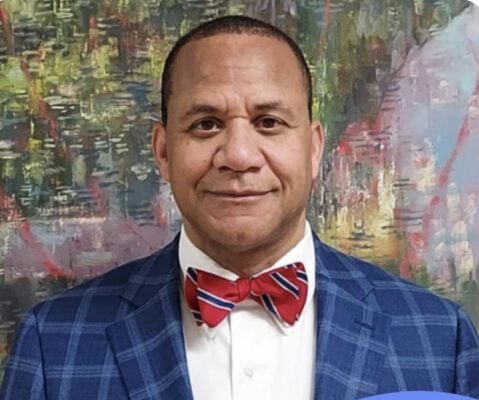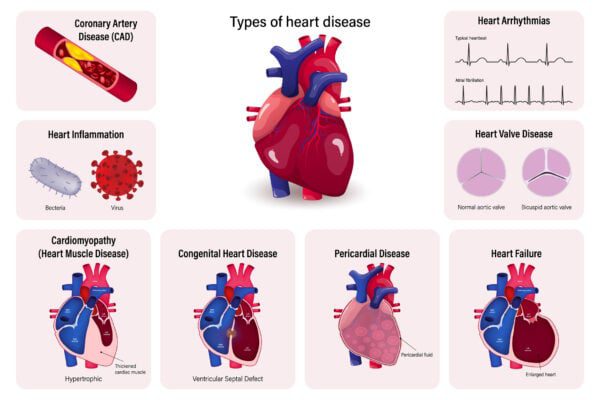Dr. J. Mario Pyles is an interventional cardiologist with Ascension St. Vincent specializing in complex coronary artery treatment, peripheral vascular disease and hypertension.
As a Fellow of both the American College of Cardiology and the Society of Cardiac Angiography and Interventions, Pyles focuses not only on treating heart attacks and restoring blood flow, but also on prevention through education, early detection and healthy living. Motivated in part by the loss of his father to a heart attack, he believes strongly in the power of nutrition, community access and early intervention.
In an interview with the Recorder, Pyles discusses how heart disease impacts the Black community, early signs to watch for and the importance of food as medicine.
Responses have been edited for clarity and brevity.

Why did you choose cardiology?
Dr. J Mario Pyles: Cardiology deals with the entire body.
Cardiovascular disease affects every organ — the brain, lungs and of course the heart. The heart is crucial in maintaining a homeostatic environment for the whole body. My father died of a heart attack, and I wanted to make sure other families didn’t have to go through the same thing.
Prevention and screening are huge. We always say, “Food is medicine.” Good food helps build a strong vascular system, and that’s one of the reasons I chose this field.
What exactly is heart disease, and why is it a serious issue in the Black community?
Pyles: Heart disease is a general term for conditions that affect the heart and blood vessels. The heart has four chambers and four valves, and diseases that impair their function fall under heart disease.
The most common is coronary artery disease — or “hardening of the arteries.” This starts with plaque buildup in the artery walls, beginning in childhood, often due to poor diet or genetics. These plaques are made of fatty cells, cholesterol and inflammatory cells. When plaques grow beyond about 40% of the artery wall, symptoms begin — sometimes resulting in a heart attack.
In the Black community, we see a higher prevalence of risk factors like high blood pressure, diabetes, obesity and high cholesterol. Add to that the structural and social determinants of health — like food deserts, lack of health education and limited access to care — and it makes cardiovascular disease more severe and more widespread.
There’s also a great article by Dr. Modell Ognisogunnyi at Emory University, published in the “Journal of the American College of Cardiology” in 2022, about achieving cardiovascular equity in underserved and African American communities.

What are some early signs of heart disease that people should watch for?
Pyles: Chest pain, shortness of breath, fatigue, swelling in the feet, dizziness — these are signs the heart may be under stress. If someone experiences chest discomfort that radiates to the jaw, arm or even down to the abdomen during exercise, that could indicate serious blockage or a ruptured plaque.
What preventive steps should people take to reduce their risk?
Pyles: First, food is medicine. Healthy food choices are foundational — low in salt, low in saturated fat, rich in fruits and vegetables. Next is exercise: 150 minutes a week of aerobic activity. I often hear, “Well, I walk at work.” That’s good, but it’s not enough. You need something extra that elevates your heart rate and builds cardiovascular strength.
Stress management is crucial, too. Chronic stress increases hormones like adrenaline and cortisol, which contribute to high blood pressure, high cholesterol and plaque buildup. Stress also leads to unhealthy coping habits like smoking, poor diet and physical inactivity.
Are there any specific resources at Ascension St. Vincent for heart health or healthy eating?
Pyles: Yes, we participate in the SNAP program — the Supplemental Nutrition Assistance Program — which provides access to food pantries with vegetables, fruits and lean proteins. We always say food is medicine, and SNAP is one way to get nutritious options into the community.
We also offer world-class cardiovascular care right here in Indianapolis. You don’t need to travel out of state. We provide diagnostics, interventional surgery, stenting, medical therapy and advanced treatment for arrhythmias like atrial fibrillation. Our electrophysiologists do catheter ablations and implant devices to prevent stroke. We also have surgical teams doing valve repairs and minimally invasive procedures with excellent outcomes.

Any final thoughts or additional things you’d like people to know?
Pyles: Know your numbers. Know your blood pressure, cholesterol, lipid profile and especially in the Black community, your LP(a) level. That’s a sticky part of LDL cholesterol that can increase cardiovascular risk, and it’s genetic. Knowing your hemoglobin A1C is important too — it should be under 5.7 if possible. If you’ve developed diabetes, you’ve likely already developed vascular disease.
Also, I want to talk about sleep apnea. It’s a huge, often overlooked issue. People with poor sleep, who snore or stop breathing at night, may be suffering from obstructive or central sleep apnea. It leads to inflammation, fatigue and high stress levels, which compound cardiovascular risk. And it doesn’t just affect people who are overweight — even people in good shape can have it.
Any last piece of advice you’d want to share?
Pyles: If you’re experiencing any symptoms of a heart attack — shortness of breath, chest pain, unusual fatigue — call 911 immediately. Don’t try to drive yourself. Seconds matter.
For more information about Ascension St. Vincent’s cardiology program, visit healthcare.ascension.org/specialty-care/cardiology/.
This reporting is made possible by a grant from the Indianapolis African-American Quality of Life Initiative, empowering our community with essential health insights. https://iaaqli.org/
Contact Health & Environmental Reporter Hanna Rauworth at 317-762-7854 or follow her on Instagram at @hanna.rauworth.
Hanna Rauworth is the Health & Environmental Reporter for the Indianapolis Recorder Newspaper, where she covers topics at the intersection of public health, environmental issues, and community impact. With a commitment to storytelling that informs and empowers, she strives to highlight the challenges and solutions shaping the well-being of Indianapolis residents.









